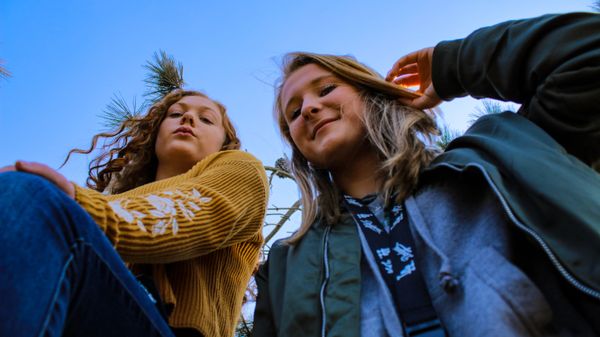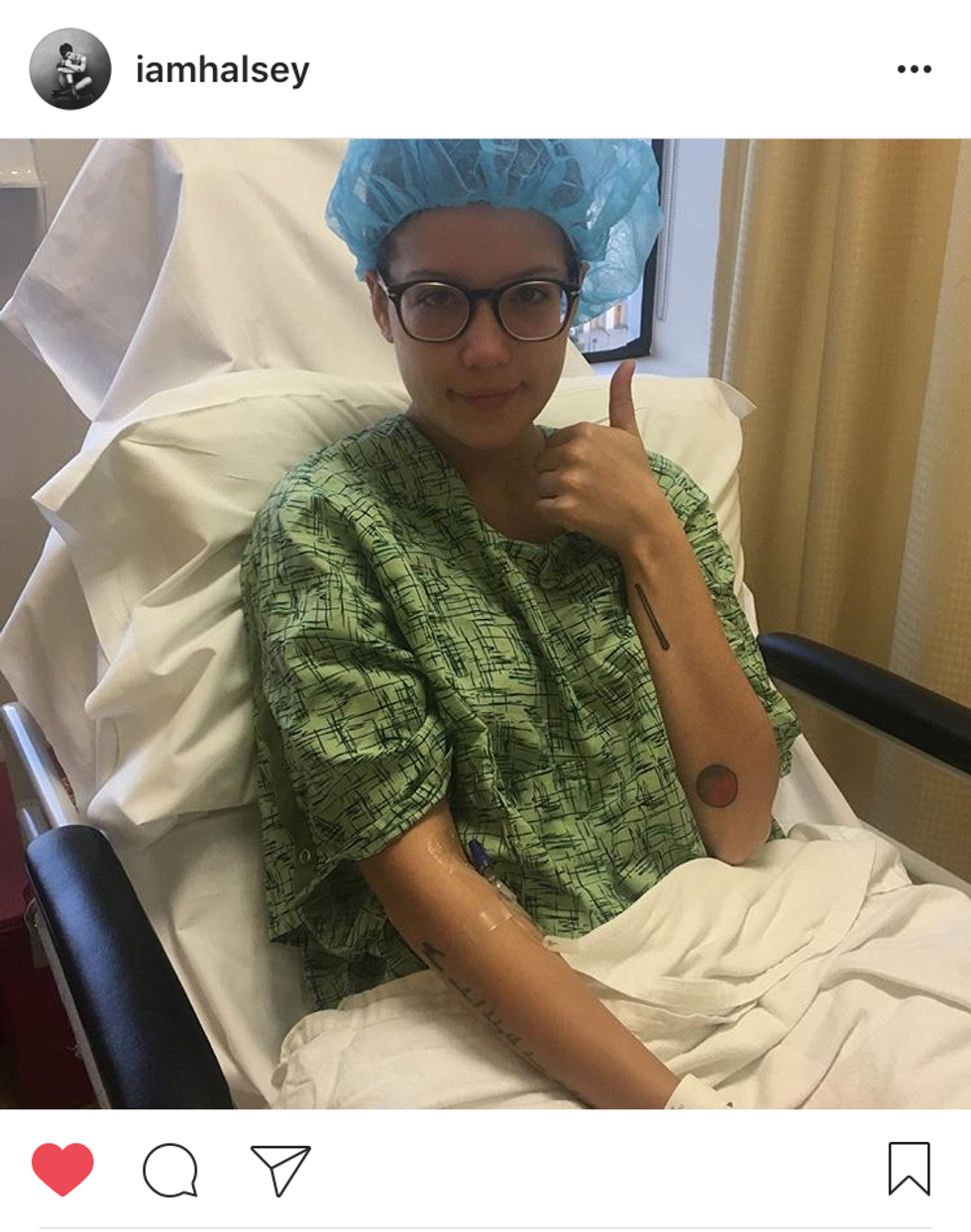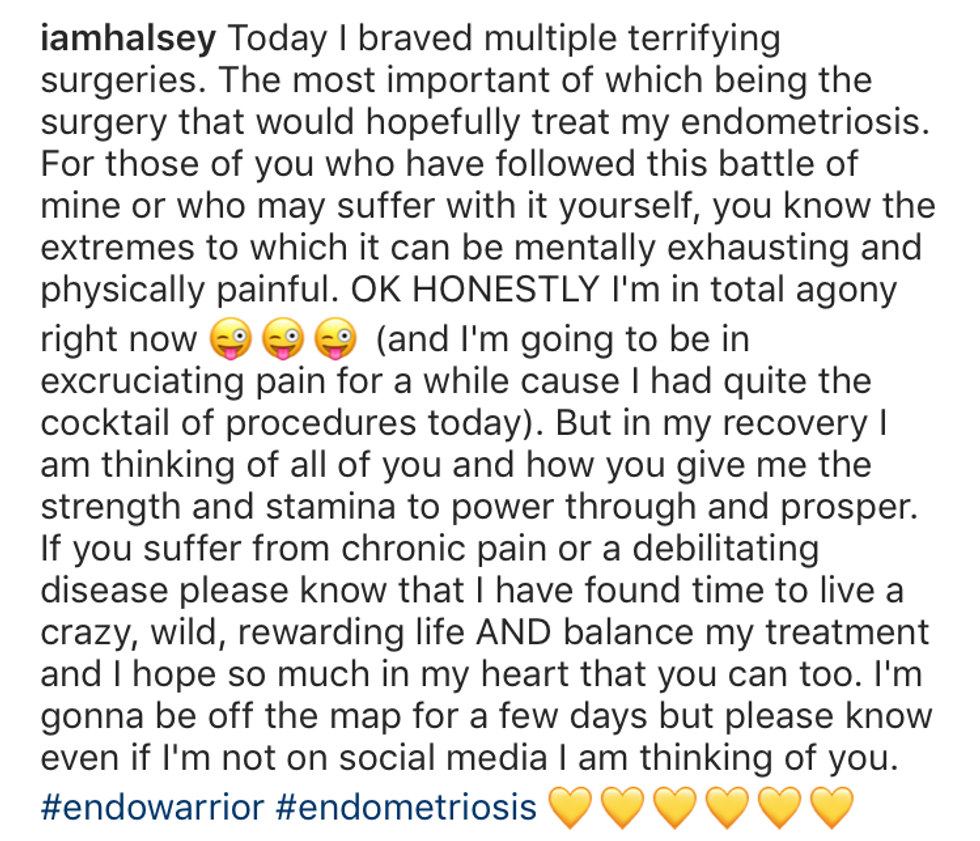Halsey uploaded this Instagram post after undergoing surgery to battle and treat her endometriosis. When I came upon her photo and read the caption, I was immediately brought to tears.
This lead me to write the following "thank you" letter:
Halsey,
Ironically, at the very moment that I read your most recent post on Instagram, I was in bed drugged up on the max dose of Ibuprofen and Tylenol, icepack under my lower back, heating pad on my stomach, trashcan on the floor (in case the nausea I had been experiencing since 3 that morning turned into the real thing), tears already in my eyes from the excruciating cramps (that had lead me to actually pass out on my way to the bathroom), in a very deep fog of anxiety and depression over how helpless and alone I felt, and how god damn tired I was of being in constant, invisible pain that only I could see. There I was, a fan with endometriosis, experiencing my symptoms at an all-time worst—finally getting the validation that I had been searching for so desperately for so many years.
I live in chronic pain that really can’t be seem by those around me. About 14-18 days out of every month, I experience the above symptoms on all categories of the pain scale, sometimes separately, sometimes all at once—too often all at once—and on those days, it is the hardest. I live with a relentless black cloud hanging over my head, knowing that today might be a good day, but tomorrow might be bad enough to keep me from doing what I want to do, or worse, what I need to do. Or, what might be even worse than that, is the elephant in the room at doctor’s visits and family get-togethers when my questionable future as a mother is brought up- that elephant being that statistics might be against me when it comes to my fertility, especially since I have already miscarried once.
No one really gets my disorder because they just can’t see it. We as humans are programmed to only believe what we can physically see and endometriosis may as well be crowned as the champion of playing hide and seek. Since I was 18, I was labeled with IBS, a gluten allergy, a dairy allergy, told to lose weight, told to exercise more, told to sleep more, told I was a hypochondriac, put on countless diets, prescribed a long list of vitamins, pain medications, antidepressants, and birth control pills. I did everything I said, I followed the diets perfectly, I took the medications, I even lost 50 lbs. Nothing changed. 4 doctors, 3 specialists, and 2 procedures later—here I am, properly diagnosed. I have at least been able to begin to somewhat manage my symptoms. I at least have a name for the monster inside of me.
"For those of you who have followed this battle of mine or who may suffer with it yourself, you know the extremes to which it can be mentally exhausting and physically painful."
I didn’t realize how serious it was until I was in the hospital a week after my 18th birthday. After passing out from the cramps a few times, the nurses asked me to rate my pain. I said I was a 6 or a 7. They ended up having to give me morphine and thought it was my appendix or something serious. It wasn’t my appendix. Later, the doctor comes in to tell me that I rated pain as a 6 or 7 that most people would have rated as a 10. I was of course confused and said: “it just feels like the worst period cramps I’ve had yet, but not much worse than they normally are.” That is the day that I realized the pain I had been experiencing for years wasn’t normal.
It too often feels like I just can’t do the things I want to do in life. It too often feels like I am doomed to be alone. I want to be a mother, I want to be a healer-- I want to be strong. My endometriosis threatens all of those things and it is nearly impossible not to let it completely burn out my hope and desire to be motivated. You, Halsey, lit that fire inside of me again.
"If you suffer from chronic pain or debilitating disease please know that I have found the time to live a crazy, wild, rewarding life AND balance my treatment and I hope so much in my heart that you can too."
Halsey, thank you for validating my disorder, my pain, my depression, my setbacks. Thank you for reassuring me that I can still live an adventurous, full, happy life despite my endometriosis. Thank you for reminding me that there is hope and there is joy and there are opportunities to do great, big things even if I am a little broken. Thank you for reminding me that I can be strong and in pain at the same damn time. Thank you for speaking out about a condition that is so common among women, but so uncommon among conversations. Not only do your words apply to endometriosis, but to any invisible illnesses and chronic pain disorders that fly under the radar simply because you can’t see them.
Our pain may be silent, invisible—but our pain is real. We can still be strong, be adventurous, be motivated, be unstoppable and be anything we want to be and be in pain at the same time. We may be a little broken, run-down and burnt-out, but we are still here, we are still living, and we will not stop living altogether just because we are living with chronic pain. Halsey, you are proof of that.
Thank you.
Love,
A Fan & A Fellow #EndoWarrior






















